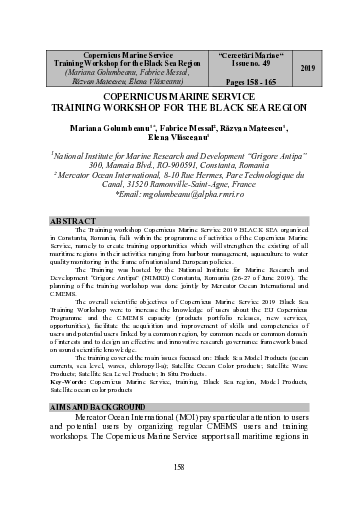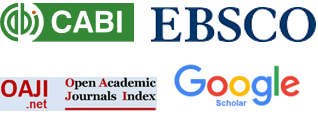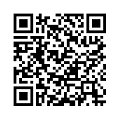Copernicus Marine Service Training Workshop for the Black Sea Region
DOI:
https://doi.org/10.55268/CM.2019.49.158Keywords:
Copernicus Marine Service, training, Black Sea region, Model Products, Satellite ocean color productsAbstract
The Training workshop Copernicus Marine Service 2019 BLACK SEA organized in Constanta, Romania, falls within the programme of activities of the Copernicus Marine Service, namely to create training opportunities which will strengthen the existing of all maritime regions in their activities ranging from harbour management, aquaculture to water quality monitoring in the frame of national and European policies. The Training was hosted by the National Institute for Marine Research and Development “Grigore Antipa” (NIMRD) Constanta, Romania (26-27 of June 2019). The planning of the training workshop was done jointly by Mercator Ocean International and CMEMS. The overall scientific objectives of Copernicus Marine Service 2019 Black Sea Training Workshop were to increase the knowledge of users about the EU Copernicus Programme and the CMEMS capacity (products portfolio releases, new services, opportunities), facilitate the acquisition and improvement of skills and competencies of users and potential users linked by a common region, by common needs or common domain of interests and to design an effective and innovative research governance framework based on sound scientific knowledge. The training covered the main issues focused on: Black Sea Model Products (ocean currents, sea level, waves, chloropyll-a); Satellite Ocean Color products; Satellite Wave Products; Satellite Sea Level Products; In Situ Products.
Downloads
Published
2019-12-20
How to Cite
Golumbeanu, M., Messal, F., Mateescu, R., & Vlăsceanu, E. (2019). Copernicus Marine Service Training Workshop for the Black Sea Region. Cercetări Marine - Recherches Marines, 49(1), 158–165. https://doi.org/10.55268/CM.2019.49.158
Issue
Section
ORIGINAL ARTICLES
License
This is an open access journal, which means that all content is freely available without charge to the user or his/her institution. Users are allowed to read, download, copy, distribute, print, search, or link to the full texts of the articles, or use them for any other lawful purpose, without asking prior permission from the publisher or the author. This is in accordance with the BOAI definition of open access.






